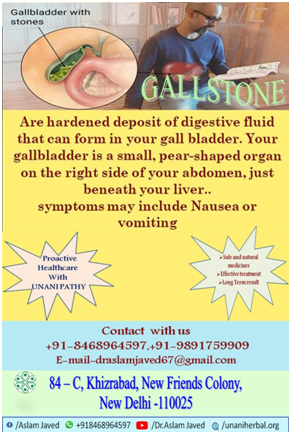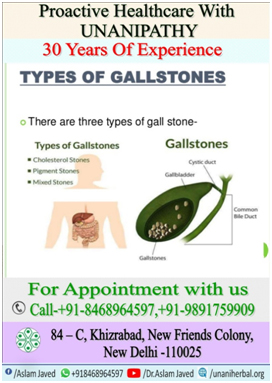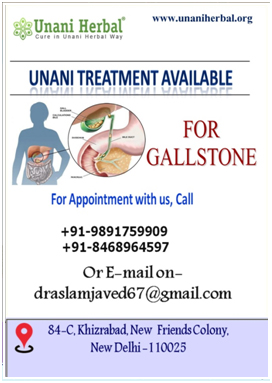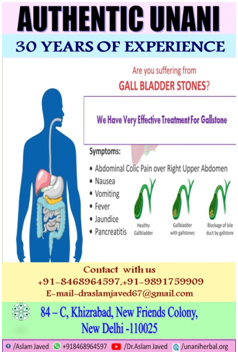What are gallstones?
Gallstones are hard, pebble-like pieces of material, usually made of cholesterol or bilirubin, that form in your gallbladder. Gallstones can range in size from a grain of sand to a golf ball. The gallbladder can make one large gallstone, hundreds of tiny stones, or both small and large stones.
When gallstones block the bile ducts of your biliary tract, the gallstones can cause sudden pain in your upper right abdomen. This pain is called a gallbladder attack, or biliary colic. If your symptoms continue and they’re left untreated, gallstones can cause serious complications.
However, most gallstones don’t cause blockages and are painless, also called “silent” gallstones. Silent gallstones usually don’t need medical treatment.

Types of gallstones
The three main types of gallstones are
- cholesterol stones
- pigment stones
- Mixed stones
Cholesterol stones are usually yellow-green in color and are made of mostly hardened cholesterol. In some countries, cholesterol stones make up about 75 percent of gallstones.1
Pigment stones are dark in color and are made of bilirubin. Some people have a mix of both kinds of stones

Gallstones Causes
Gallstones occur when bile forms solid particles (stones) in the gallbladder
- The stones form when the amount of cholesterol or bilirubin in the bile is high.
- Other substances in the bile may promote the formation of stones
- Pigment stones form most often in people with liver disease or blood disease, who have high levels of bilirubin.
- Poor muscle tone may keep the gallbladder from emptying completely. The presence of residual bile may promote the formation of gallstones
Risk factors for the formation of cholesterol gallstones include
- Being age 40 or older
- Being a Native American
- Being a Mexican-American
- Being overweight or obese
- Being sedentary
- Being pregnant
- Eating a high-fat diet
- Eating a high-cholesterol diet
- Eating a low-fiber diet
- Having a family history of gallstones
- Having diabetes
- Losing weight very quickly
- Taking medications that contain estrogen, such as oral contraceptives or hormone therapy drugs
- Having liver disease
Gallstones are the most common cause of gallbladder disease.
As the stones mix with liquid bile, they can block the outflow of bile from the gallbladder. They can also block the outflow of digestive enzymes from the pancreas.
If the blockage persists, these organs can become inflamed. Inflammation of the gallbladder is called cholecystitis. Inflammation of the pancreas is called pancreatitis.
Contraction of the blocked gallbladder causes increased pressure, swelling, and, at times, infection of the gallbladder.

Gallstones Symptoms
Most people with gallstones have no symptoms. In fact, they are usually unaware that they have gallstones unless symptoms occur. These "silent gallstones" usually require no treatment. Symptoms usually occur as complications develop. The most common symptom is pain in the right upper part of the abdomen. Because the pain comes in episodes, it is often referred to as an "attack."
- Attacks may occur every few days, weeks, or months; they may even be separated by years.
- The pain usually starts within 30 minutes after a fatty or greasy meal.
- The pain is usually severe, dull, and constant, and can last from one to five hours.
- It may radiate to the right shoulder or back.
- It occurs frequently at night and may awaken the person from sleep.
- The pain may make the person want to move around to seek relief, but many patients prefer to lay still and wait for the attack to subside.
Other common symptoms of gallstones
- nausea and vomiting,
- fever,
- indigestion, belching, bloating,
- intolerance for fatty or greasy foods, and
- jaundice (yellowing of the skin or the whites of the eyes).

Prevention tips
You can reduce your risk of gallstones if you:
- Don't skip meals. Try to stick to your usual mealtimes each day. Skipping meals or fasting can increase the risk of gallstones.
- Lose weight slowly. If you need to lose weight, go slow. Rapid weight loss can increase the risk of gallstones. Aim to lose 1 or 2 pounds (about 0.5 to 1 kilogram) a week.
- Maintain a healthy weight. Obesity and being overweight increase the risk of gallstones. Work to achieve a healthy weight by reducing the number of calories you eat and increasing the amount of physical activity you get. Once you achieve a healthy weight, work to maintain that weight by continuing your healthy diet and continuing to exercise.
Treatment
Twelve to Fourteen month’s treatment with our Unani Herbal Medicines without any side effect and 100% natural….

Nomination form for 2017 Global Awards :
http://www.unaniherbal.org/nomination-form.html
For more information you can also follow us on:

 If you wish to cancel your subscription to this newsletter click here
Copyright 2014 Unani Herbal
If you wish to cancel your subscription to this newsletter click here
Copyright 2014 Unani Herbal

